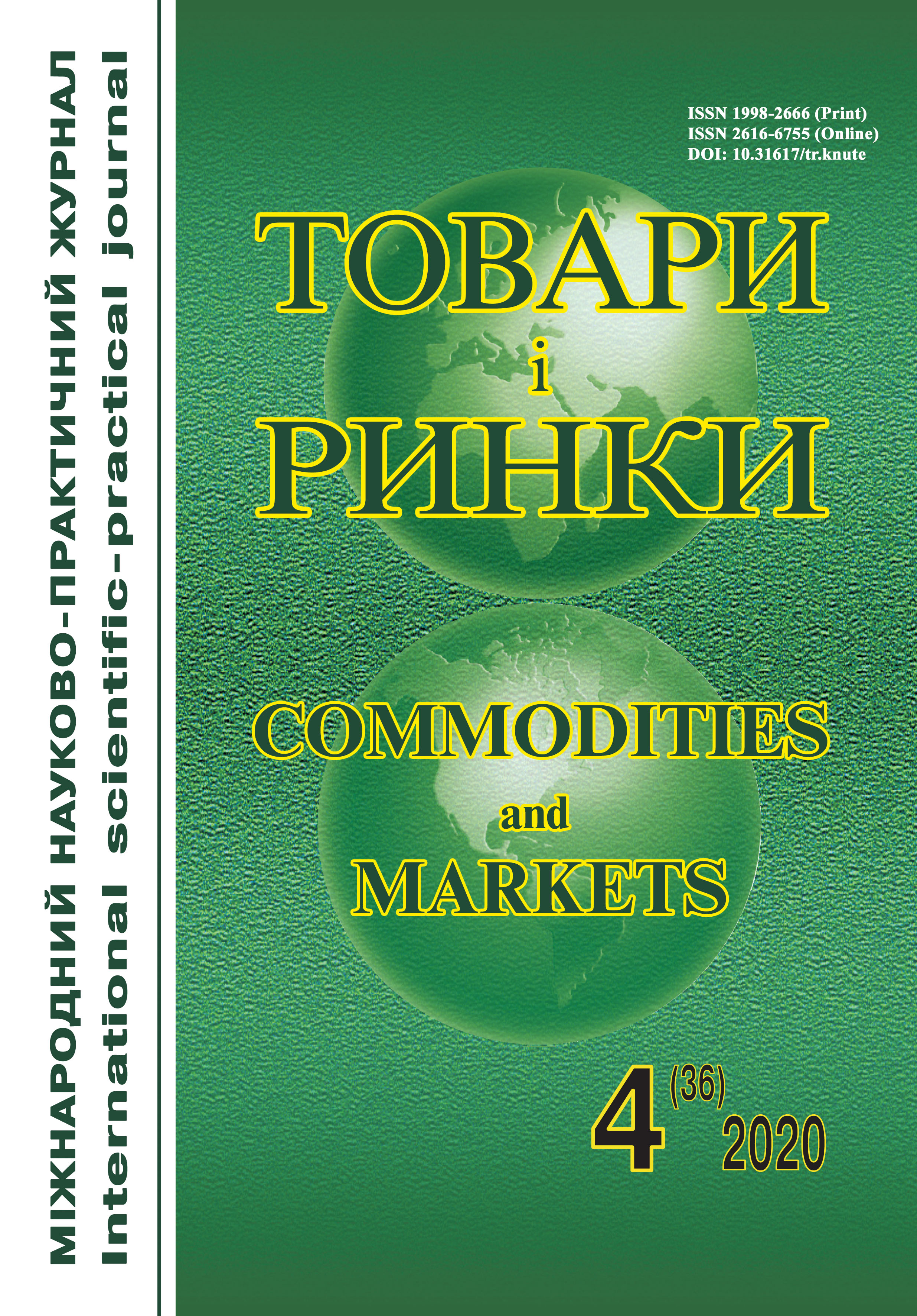Deformation of consumer demand under the influence of artificial information asymmetry
DOI:
https://doi.org/10.31617/tr.knute.2020(36)01Keywords:
artificial information asymmetry, deceptive advertising, consumer value, consumer demand, price personalizationAbstract
Background. The formation of the information economy has stimulated economic entities to form and operate artificial information asymmetry, which highlights the importance of research in this problematic area.
Analysis of recent research and publications. Information asymmetry has become the subject of research by a number of Nobel laureates and less-known economists who have studied the effects of artificial information asymmetry in the system of "principal-agent" relations, competitive, contractual relations, and so on.
The aim of the article is to determine the mechanism of influence of artificial information asymmetry on consumer demand.
Materials and methods. The research is based on the theoretical and economic analysis of scientific works of researchers of the phenomenon of information asymmetry, as well as the analytical processing of statistical data. Graphic modelling of the influence of manipulative practices of creating artificial information asymmetry on the consumer value of economic good is carried out.
Results. Deceptive commercial practices are becoming increasingly popular in the information economy, making it possible to critically increase the consumer value of economic benefits in terms of its emotional component. At the same time, the use of digital algorithms for consumer identification and collection of consumer histories allows the most productive exploitation of the corresponding increase in consumer value, converting it into additional income by means of price personalization.
Conclusion. Regardless of the tool used to increase information asymmetry between buyers and sellers of consumer goods, the mechanism of its deforming influence remains unchanged: the primary deformation is subjective assessment of the total utility of consumption of goods, which causes overestimation of the emotional component of its consumer value, resulting in deformed consumer demand, the reserve price of the corresponding good increases, and with it – the personalized price of its sale for the concrete consumer.
References
Coremans, E., & Kerremans, B. (2017). Agents as Information Asymmetry Managers in EU Trade Policy-Making. Delreux T., & Adriaensen J. (Eds.). The Principal Agent Model and the European Union. (pp. 227-253). London: Palgrave Macmillan [in English].
Matrolia, T., & Ren, Z. (2018). Principal-Agent Problem with Common Agency Without Communication. SIAM Journal on Financial Mathematics. (Vol. 9). (Issue 2), (pp. 775-799) [in English].
Gorbachuk, V., Dunaievskyi, M., & Suleimanov, S. (2019). Modeling of Agency Problems in Complex Decentralized Systems Under Information Asymmetry: Proceedings of 2019 IEEE International Conference on Advanced Trends in Information Theory (ATIT). (pp. 449-454). Kyiv [in English].
Bénabou, R., Falk, A., & Tirole, J. (2019). Narratives, Imperatives, and Moral Reasoning. Discussion Paper N 070. Collaborative Research Center Transregio 224 [in English].
Hart, Oliver. (2017). Incomplete Contracts and Control. American Economic Review. (Vol. 107). (Issue 7), (pp. 1731-1752) [in English].
Shen, B., Choi, T.-M., & Minner, S. (2019). A review on supply chain contracting with information considerations: information updating and information asymmetry. International Journal of Production Research. (Vol. 57). (Issue 15-16), (pp. 4898-4936) [in English].
Kotler, F. (2018). Marketyng 4.0 [Marketing 4.0]. Kyi’v: Vydavnycha grupa KM-BUKS [in Ukrainian].
Arnosti, N., Beck, M., & Milgrom, P. (2016). Adverse selection and auction design for internet display advertising. American Economic Review. (Vol. 106). (Issue 10), (pp. 2852-2866) [in English].
Zvity Antymonopol’nogo komitetu Ukrai’ny, 2014–2018 rr. [Reports of the Antimonopoly Committee of Ukraine, 2014–2018]. Retrieved from https://amcu.gov.ua/pro-nas/zvitnist/richni-zviti [in Ukrainian].
Consumer compliance statistics. Complaints data 2006–2018. European Commission. Retrieved from https://ec.europa.eu/info/policies/consumers/consumer-protection/evidence-based-consumer-policy/consumer-complaints-statistics_en [in English].
Global advertising spending from 2010 to 2019. Statista. Retrieved from https://www.statista.com/statistics/236943/global-advertising-spending [in English].
Smit, A. (1997). Teorija nravstvennyh chuvstv [The theory of moral feelings]. Moscow: Respublika [in Russian].
Veblen, T. (1899). Theory of the Leisure Class: An Economic Study in the Evolution of Institutions. NY: Macmillan [in English].
Bodrijjar, Zh. (2006). Obshhestvo potreblenija. Ego mify i struktury [Consumer society. Its myths and structures]. Moscow: Respublika [in Russian].
Debor, G. (2000). Obshhestvo spektaklja [Society of the performance]. Moscow: Logos [in Russian].
Gerasymenko, A. G. (2014). Rynkova vlada: dzherela, masshtaby, naslidky [Market power: sources, scale, consequences]. Kyi’v: Kyi’vs’kyj nacional’nyj torgovel’no-ekonomichnyj universytet [in Ukrainian].
Dorfmnan, R., & Steiner, P. O. (1954). Optimal Advertising and Optimal Quality. American Economic Review. (Vol. 44), (pp. 826-836) [in English].
Gerasymenko, A. G. (2020). Nova normal’nist’ ekonomiky HHI st. [New normality of the economy of the XXI century]. Visnyk Kyi’vs’kogo nacional’nogo torgovel’no-ekonomichnogo universytetu – Herald of Kyiv National University of Trade and Economics, 3 (131), 5-26. doi: http://doi.org/10.31617/visnik.knute.2020(131) [in Ukrainian].
Enberg, J. Global Digital Ad Spending 2019: Digital Accounts for Half of Total Media Ad Spending Worldwide. Retrieved from https://www.emarketer.com/content/global-digital-ad-spending-2019 [in English].
Bourreau, M., & Streel, A. (2018). The regulation of personalised pricing in the digital era. OECD paper DAF/COMP/WD(2018)150. Retrieved from https://one.oecd.org/document/DAF/COMP/WD(2018)150/en/pdf [in English].
On Orbitz, Mac Users Steered to Pricier Hotels. Wall Street Journal. (2012). Retrieved from https://www.wsj.com/articles/SB10001424052702304458604577488822667325882 [in English].
Ipsos, London Economics and Deloitte. Consumer market study on online market segmentation trough personalised pricing/offers in the European Union, Study for the European Commission. (2018). Retrieved from https://ec.europa.eu/info/sites/info/files/aid_development_cooperation_fundamental_rights/aid_and_development_by_topic/documents/synthesis_report_online_personalisation_study_final_0.pdf [in English].
Shiller, B. (2014). First-Degree Price Discrimination Using Big Data: Working paper 58. Brandeis University. Retrieved from https://www.brandeis.edu/economics/RePEc/brd/doc/Brandeis_WP58R2.pdf [in English].
Dubé, J. P., & Misra, S. (2018). Scalable Price Targeting: NBER Working Papers N 23775. Retrieved from https://marketing.wharton.upenn.edu/wp-content/uploads/2018/01/01-25-2018-Misra-Sanjog-PAPER-targeted_pricing.pdf [in English].



